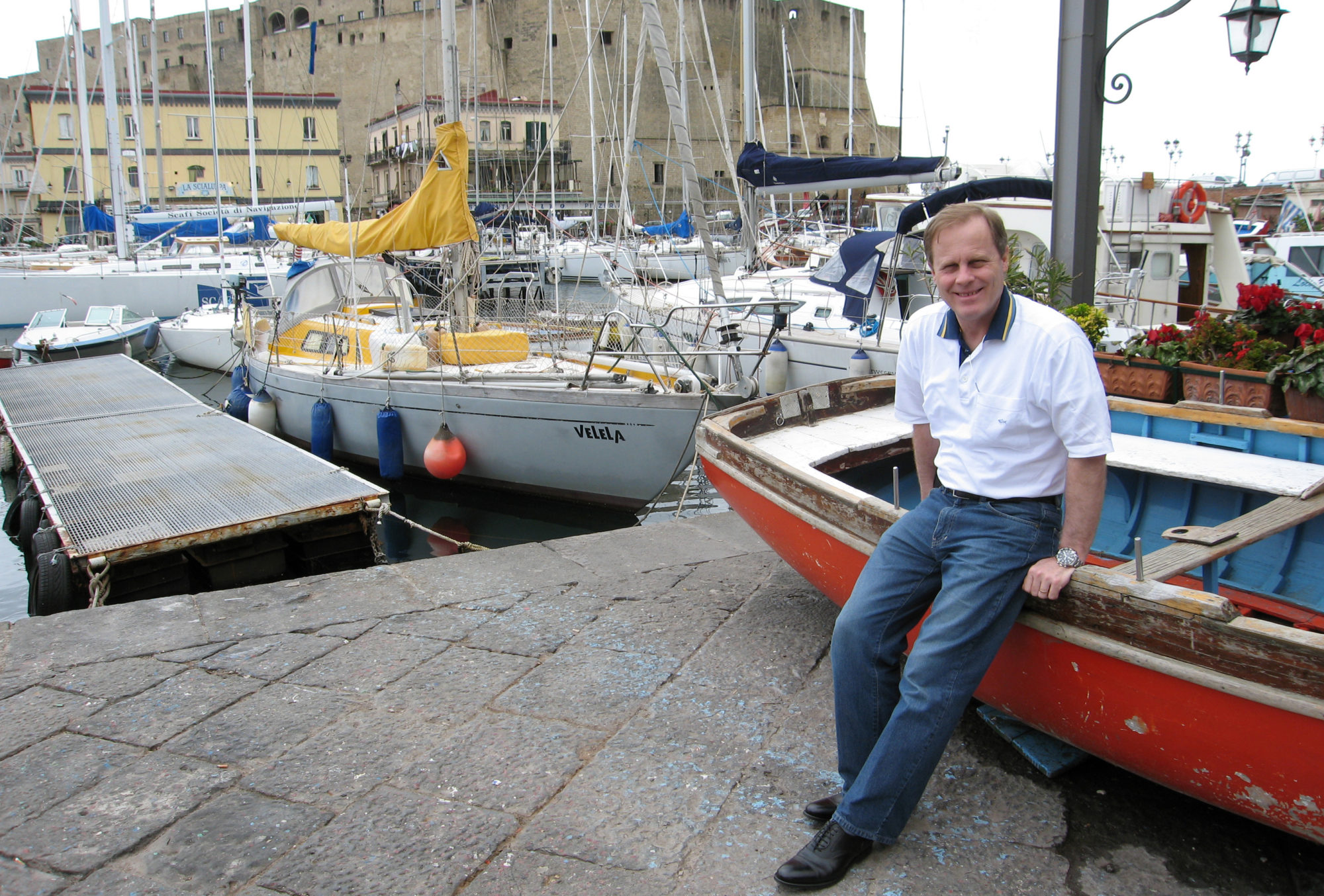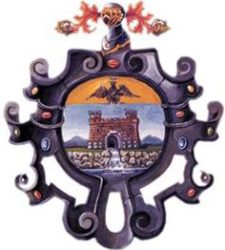The Greatest Love Story Ever Told
At sixteen, nothing seemed missing in my life.
Dad was a respected and successful Italian businessman in Rome whose advice was sought by investors from all over Italy and the United States. Mom was a beautiful former TWA stewardess from Chicago who had quit her job in order to marry him.
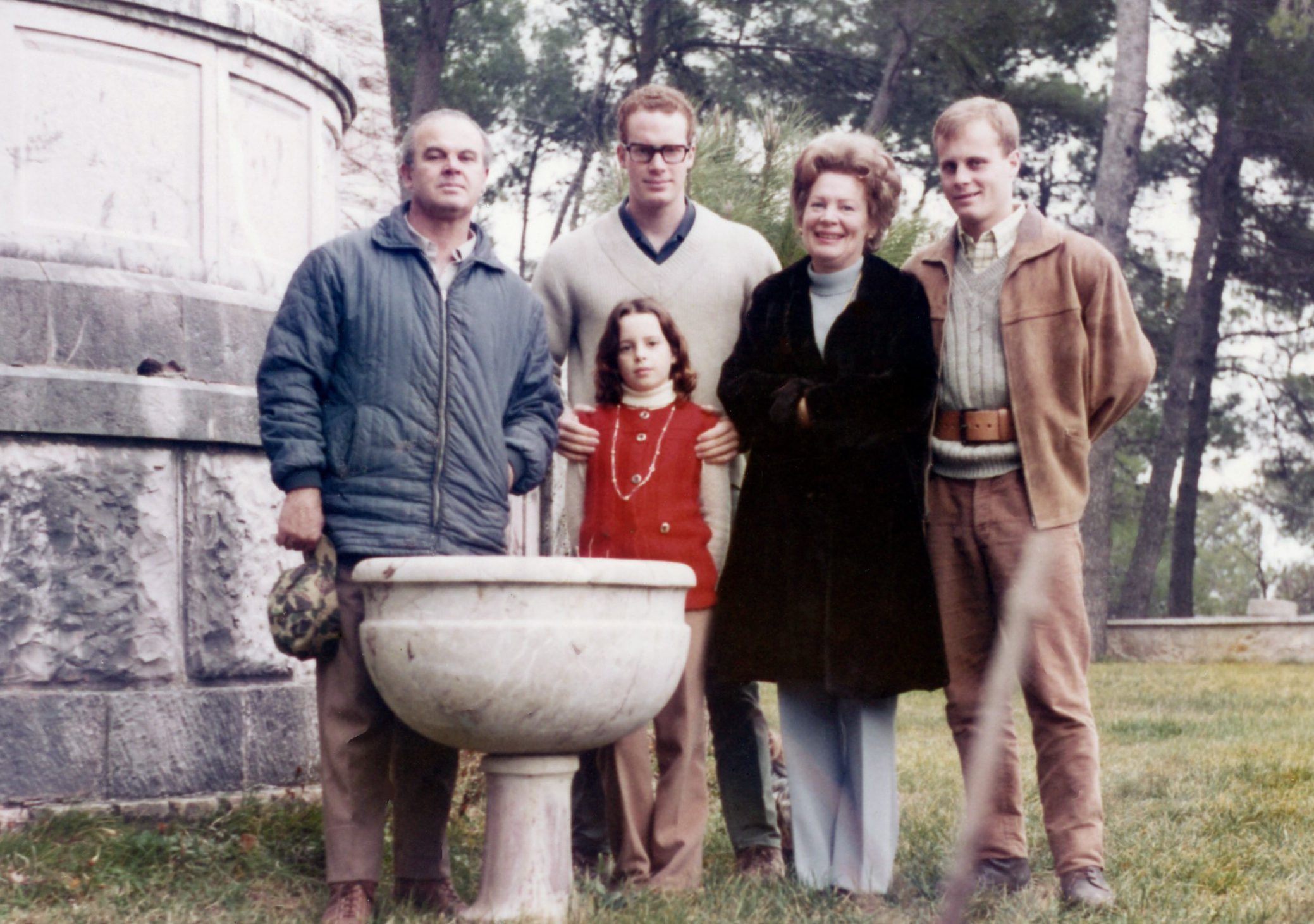
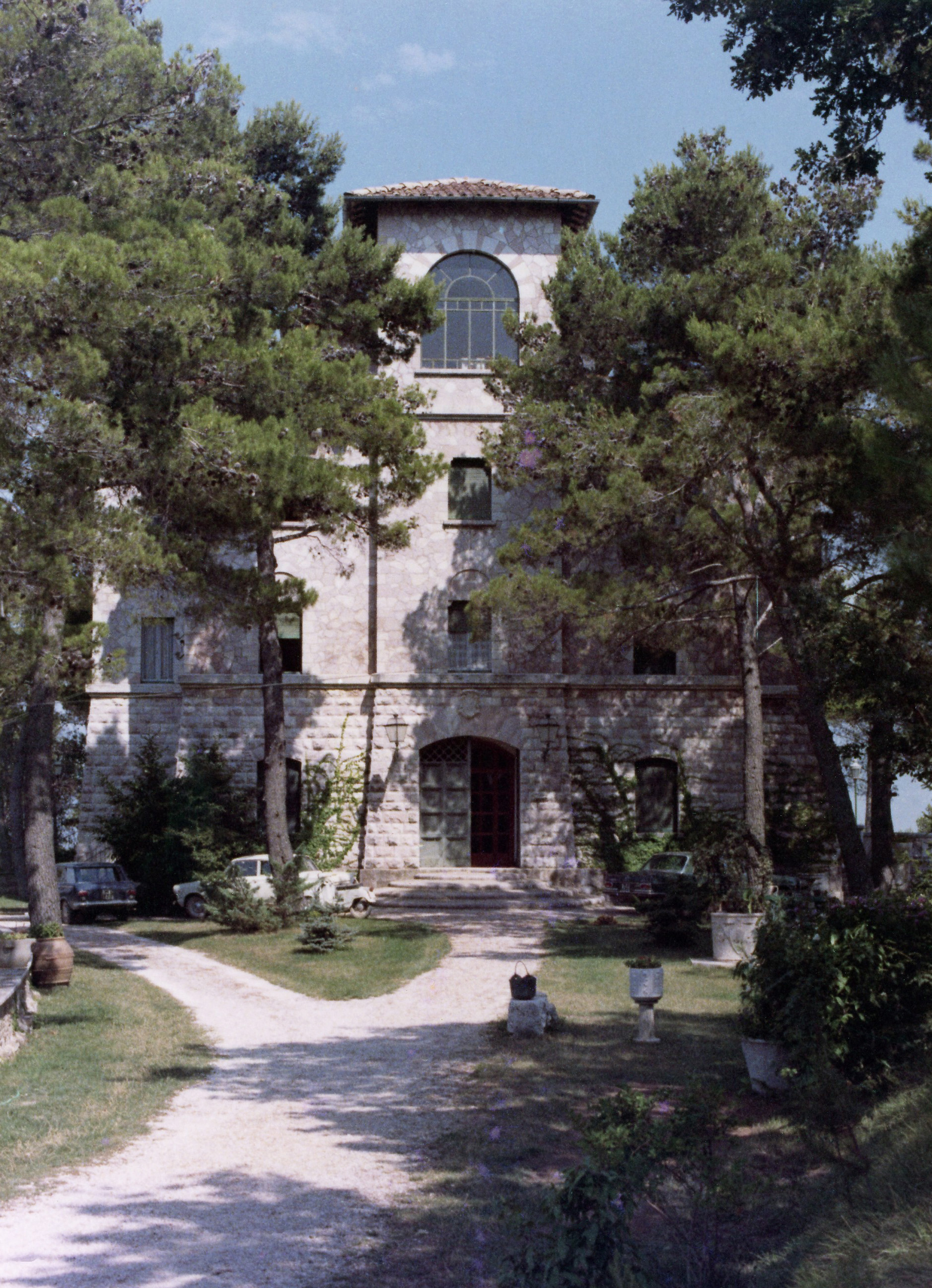
As I was growing up in the ancient capital of Italy during the 50s and 60s — the golden years after the Second World War— my parents gave me abundant love and attention, and provided me with everything a young son could ever need and more, including the latest five-speed Gilera motorcycle. We lived in the upscale Parioli section of Rome and spent one half of the summer in a walled villa in the fashionable nearby sea resort town of Fregene, the other half in a hand-carved, pink-stone mansion nestled in the green hills of Umbria near ancient Spoleto. I think that at one point we had six servants working for us. Many who knew us thought we were living the easy life.
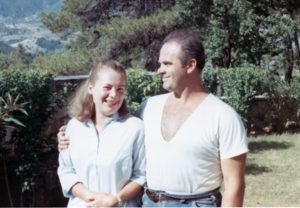
While attending an American high school in Rome, I spent countless hours after class practicing basketball, then went straight to an indoor swimming pool close to our top-floor apartment to train with a local swim club. Being better at athletics than classwork, I focused on excelling in every sport and staying more physically fit than anyone else. In those days, what defined you was the number of push-ups and pull-ups you could do—as well as how long you could run, bike, row, and swim without stopping. My world was one long Rocky-Balboa-style training session.
Yet all of the affluence and activity left unanswered some basic and burning questions: Why are we here? Where are we going next? How should I live my life?
I really wanted to please God. But I had no idea who or where he was.
As I grew older, conflicts with the authority figure in my life, my wonderful dad, began to emerge; and eventually with my very sweet mom as well. And the conflicts intensified. By the time I was fourteen my relationship with both of them had deteriorated significantly, thanks to my own bad attitude and moodiness rather than anything they were doing wrong. It seemed that their firstborn son, from whom they had expected so much, had veered off in an unpredicted and worrisome direction.
I became the subject of long and anxious private discussions between them.
Despite the friction with my parents, I still thought that I must be a pretty good person, and in my pride even regarding myself as considerably better than my peers. After all, did I not often go out of my way for the sake of others, buy flowers for mom, care for and show respect to my relatives and the elderly in general? Did I not take the side of underdogs and readily assist anyone in need? Did I not always take pains to pay attention to the less popular girls and guys at school, and to perform random acts of kindness for one and all?
But none of the nice things I was doing for everybody sufficed to give me any peace and happiness. And mom and dad were not impressed. Why couldn’t they appreciate the honesty of my intentions and the virtue of my many selfless acts toward others?
In light of all my exemplary deeds, and exceptionally favorable view of myself,
I felt that if anyone were truly righteous and deserving of God’s favor, it was I! But I had yet to come to know him personally.
One day as I was wrestling with these questions and searching for an ultimate truth to guide me through life, I happened to come across a series of pamphlets in our home library on ESP, reincarnation, and the ability that some claim to predict the future. These seemingly prophetic individuals sought to explain the reasons for distress and suffering in the world and to foretell what would happen to us after we died. They said that we would all be returning to the earth in order to make up for the mistakes we were committing in our present life; also, that eventually, in our final reincarnations, we would attain enlightenment and perfection. I found these ideas congenial. They seemed to provide a convincing explanation of our present as well as our future. They meshed with my own way of thinking.
It now looked as if I could become everything I wanted to—but had not yet—become. I decided that by following this religious system I could and surely would attain spiritual enlightenment!
Moreover, far from excluding other faiths, my newfound and amazing view of life incorporated tenets of Buddhist, Hindu, Catholic, Jewish, Muslim, and all other religious beliefs from around the world into a single comprehensive worldview. The many different spiritual convictions of mankind could each contribute a portion of truth to this mother of all religions. Nor would anyone be deprived of the benefits of this religion. Not one woman or man would miss the opportunity for salvation… even if some people might take a little longer than others to achieve perfection. Even persons like Attila the Hun, Genghis Khan, Torquemada, Ivan the Terrible, Robespierre, Hitler, Stalin, Mao and Castro could be well on their way to moral perfection! Everyone—not just an exclusive contingent of Mother Teresa types—would have the chance to reach a higher spiritual position.
It was brilliant. Exactly what I had been looking for. I am going for it!
But then doubts assailed me. Would we really have another chance to live our lives and improve ourselves? And how about those most wicked of men—is it right that they should be able to get away with persecuting, torturing and killing so many multitudes with such perverse and relentless zeal? What improvements in their future lives could possibly erase their responsibility for all the evil they had done?
Meanwhile, back on planet earth, my present-day life was not getting any better. It had gotten worse. And the question was, if I were now blessed with such a wonderful philosophical viewpoint, how long would I have to wait before I could experience its benefits? How long before I feel better?
I waited and waited. But no matter how much time passed, my outstanding new beliefs did nothing to ameliorate the problems I faced. The situation at home further degenerated as I became even more stubborn in dealing with my parents, in a few instances even speaking to my father with disrespect. No enlightenment was taking place within to help me cope with or dispel the unhappiness that surrounded me. No amount of prayer, religious study or meditation changed anything. Instead of being illuminated, the world around me grew darker.
Life went on. But the arrow on my spiritual gauge was slumping toward empty, with no service stations or rest stops anywhere in sight. Athletic achievements afforded only fleeting distraction from the anguish that roiled inside. I lacked confidence, motivation, peace.
Mediocre grades contributed to my many disappointments, and every effort I made to improve was fruitless. Twice my parents scheduled a meeting for me to speak to the school authorities. After each meeting they were told, “Roland is trying to improve. Let’s take a positive approach and try to encourage him. Give him some time and he will eventually do better.”
Then things got even worse.
The Italian traffic police pulled me over as I was riding the Gilera with Margaret, a Canadian girlfriend. I still remember that gray overcast late Saturday morning as we headed for Ostia Antica, a town west of Rome on the Tyrrhenian Sea.
I did not have a driving license. Moreover, it was illegal in Italy to carry a passenger on any two-wheeled vehicle if you were not yet eighteen.
I answered the two motorcycle cops in English—praying they’d be more lenient with me if they thought I was a foreigner who could hardly be expected to know all the driving laws in Italy. Unluckily for me, though, one of them answered me in perfect American English. It seemed that until very recently, he had been living in the United States, working for the New York City traffic police department! Dumbfounded by his fluency, I found it impossible to avoid replying to any question put to me, and the cops quickly saw through my little ruse. I was trapped.
Margaret probably did not fully realize the implications of what was happening. She later told me that this had been the most exciting day of her life. Well, not for me. Making matters worse, Dad had just warned me not to ride the motorcycle and certainly not to carry any passengers, and I had gone on to disobey him on both counts. My poor father was obliged to hire an expensive
defense attorney; I still remember the exorbitance of the fee. But not even this top Roman lawyer could keep me from being condemned in the criminal court of Rome. I was now facing jail time and the shame of having a criminal record.
Out of the frying pan, into the fire.
The wheels of justice in Italy turned slowly, however, and despite my conviction, I was conditionally allowed to remain a free man rather than being immediately incarcerated.
And then I got a reprieve.
I wasn’t thinking about God, but he
must have been thinking about me. Not much more than a year after committing my transgression, Italy’s newly elected president, Giuseppe Saragat, would declare a general amnesty for certain types of criminals to commemorate his ascendancy. He pardoned me along with thousands of other Italian villains.
Although my mishap would eventually come to a benign conclusion, there had been no forgetting or forgiving at home in the interim. After the incident, dad grounded me and forbade me from riding the Gilera. More distressing still, however, was the painful awareness of his dissatisfaction with me. The crushing weight of his disapproval bore down on me continually, a burden too great to carry.
As a condition of the pardon I had to acquire an Italian motorcycle driving license. And as the state pardoned me, dad finally seemed to as well. He gave me permission to get back the Gilera and even let me ride wherever I wanted.
Finally free, like a bird let out of its cage, I flew. My joy would be fleeting, however.
One afternoon, only a few days after being allowed to ride again, I passed through a part of Rome known as Vigna Clara where my science teacher, Mr. Ceen, was playing tennis. As I was passing he beckoned me over. Studying me and the Gilera, he asked, in a concerned tone of voice, “Aren’t motorcycles like the one you are riding dangerous?”
“Well, mine is much safer than the others,” I told him.
“Be careful,” was his slow and deliberate advice.
“I will.”
The word of caution gave me a moment of discomfort, to be sure. But any apprehension I might have felt was soon swept aside by the exhilaration of the gathering speed and the wind rushing past me.
It was around this time that I made friends with an affable Italian of my age, Pasquale. We got along famously from the moment we met. Although we swam with two different swim clubs in Rome, we competed in the same event, the two-hundred-meter individual medley. Whereas I rode the Gilera, Pasquale got around on a Vespa, and a couple of times I cautioned him to watch out while navigating the streets with it. But, confident of his ability to handle the scooter, he assured me that there was no need to worry about him.
One day as the two of us were riding our bikes together, we passed through a series of blind curves close to where Mr. Ceen had expressed his words of caution just a few weeks earlier. Coming upon a rather large tree branch lying in the middle of the road, we both swerved to avoid it; so far so good. But then the Good Samaritan in me took over. I felt that we should remove the hazard so that no one else would risk getting hurt. I shouted, “Let’s go back and remove the tree branch that we just passed so other motorists don’t hit it.”
Pasquale didn’t think that going back was at all necessary; nonetheless, he acquiesced and executed a quick U-turn. Even as he completed the maneuver, he heard a car speeding toward us around the blind curves and shouted at me to watch out. I couldn’t hear the oncoming vehicle, however, and hesitated for a moment, just long enough to leave me in the path of a zooming Alfa Romeo Giulia, an Italian car known for exceptional quietness.
Someone called an ambulance. I was rushed to the closest Roman hospital, which just happened to be next door to the Vatican. Although I ended up with only a fractured metatarsal, all training for swimming and basketball was instantly over. The physical pain caused by the mishap would be as nothing compared to the distress of having to abandon sports.
As soon as dad heard about the accident, he flew back from the Canary Islands, where he had been involved in a tricky land purchase that would turn out to be a swindle and cause my father no end of frustration. (On the other side of that misbegotten deal was a shrewd and flattering Hungarian—“that gypsy” as Dad would call him). Dad came straight to the hospital from the airport. As he approached my bed, I had no doubt that he was about to express some sort of sympathy for my misfortune, as well as praise me for trying to clear the road for other travelers. On the contrary. He excoriated me, letting me know that I should feel sorry for having forced him to rush back to Italy while he was in the middle of precarious business negotiations.
Thus, my already tender morale now suffered another blow. Having just barely begun to enjoy a respite from my troubles, I now felt more helpless and dejected than ever. Why was dad so irate when I was obviously in the hospital for trying to do something I believed was good?
There was nowhere to turn and nothing to do but wait for the next misfortune to hit.
One night during our family dinner, someone compared my plaster-cast limping to the hobbling of Captain Ahab, loser of a limb to the great white whale. I left the table in tears and my self-esteem plummeted to a new low.
It seemed that the harder I struggled to please my family, help my neighbors and be at peace, the further I drifted from attaining such straightforward objectives. Other people had it worse, I knew; but the constant stream of problems while also being constantly condemned at home and having nowhere to turn for comfort left me in a slough of despond. Far from smiling down on me, fortune was laughing at me while delivering one hammer blow after another. And there seemed to be nothing I could do to stop the bombardment.
During this month of immobility and despair, my left foot eventually healed. But my bitter disillusionment lingered.
Watching my whole life being sucked into a black hole, I could hardly take satisfaction in my privileged surroundings.
I could only feel sorrier and sorrier for myself. Roland, you are so unlucky!
But then came a light at the end of the dark tunnel.
In the winter of 1965, with these painful experiences still in the forefront of my consciousness, I was invited along with a few other students to the home of a friend. There I came to know a markedly different interpretation of life than the one I had been relying on. I met Vincent Rosheger, a friendly guy who seemed to manifest genuine love, peace, and purpose, someone unlike anyone I knew. He led a Bible study.
Vincent cited verses from the Bible that showed how all of man’s problems are related to the spiritual condition of his heart, his failure to achieve the standard of moral perfection that God requires from each one of us. Our flawed lives and selfish actions keep us separated from him, preventing us from experiencing the enjoyable and happy life that our creator would like each of us to have.
The Bible says: “The Lord looks down from heaven on the entire human race; he looks to see if anyone is truly wise, if anyone seeks God. But no, all have turned away; all have become corrupt. No one does good, not a single person!” (Psalm 14:2-3).
We then looked at Romans 3:23: “Everyone has sinned; we all fall short of God’s glorious standard.” And Romans 6:23: “For the wages of sin is death.”
My first response to the assumption that I had transgressed was to question how Vincent could say all these things about me when he knew nothing about me. I am a pretty good guy. You know nothing about all the praiseworthy deeds I have done!
But Vincent showed us that it is God himself who says, through the Bible, that none of our good actions can make us acceptable to him: “We are all infected and impure with sin. When we display our good deeds, they are nothing but filthy rags” (Isaiah 64:6). Moreover, “God saves us by his grace when we believe. And we can’t take credit for this; it is a gift from God. Salvation is not a reward for the good things we have done, so none of us can boast about it” (Ephesians 2:8-9). “When God our savior revealed his kindness and love, he saved us, not because of the righteous things we had done, but because of his mercy” (Titus 3:4-5).
I discovered that to fully obey God’s moral standard, I would need to be continuously perfect or sinless my entire life. But every one of us fails to meet this requirement. We all fall short throughout the entire course of our earthly existence. Since God is blameless, anyone wanting to please him or be near him must be blameless like him. As the prophet David knew well, no one who has committed even the smallest sin can ever get close to God: “O God, you take no pleasure in wickedness; you cannot tolerate the slightest sin” (Psalm 5:4).
The Bible asserts that the penalty for disobeying God is eternal separation from him in a real physical location, described as a bottomless pit where one abides in complete darkness, to suffer eternal chains and never-ending torment. A place of horror, a bed of worms, a lake of fire. It is called hell. “As they go out, they will see the dead bodies of those who have rebelled against me. For the worms that devour them will never die, and the fire that burns them will never go out. All who pass by will view them with utter horror” (Isaiah 66:24). There would be no socializing in hell, only “weeping and gnashing of teeth” (Matthew 13:42, 13:50).
Contrary to everything I had so firmly believed about reincarnation and repeated opportunities to do better, l would not be given any second chances: “Each person is destined to die once, and after that comes judgment” (Hebrews 9:27).
I wondered why a loving God would punish anyone after having created him. But Vincent pointed out that God’s standard of justice always remains the same wherever God’s law has been broken. Justice requires restitution or retribution.
For example, according to Exodus 22, if a person steals, he is obligated to return the stolen goods and to pay the victim two to five times the value of what was stolen. One day all of us would have to answer to God for our every act of wrongdoing. Since we had no way of repaying him or making things right with him for all the times we had disobeyed his righteous law, in justice we would have to be sent to a place far from his light and glory.
I began to realize that what God says in the Bible isn’t addressed just to everyone else in the world. God was also speaking directly to me in my present spiritual condition.
But in spite of all that I was doing to displease him, God still loved me. He had provided a way to maintain his righteous standard while also delivering me from the consequences of my sins. God’s perfect justice required that none of my wrongs go unaccounted for and unpunished; the price for my innumerable wrongdoings, therefore, had to be paid either by me or by someone else. That someone else is Jesus. Jesus had died for me. He is the sinless substitute who makes it possible for God’s justice to be maintained.
In his love for us, the only perfect man had paid for the sins of a very imperfect man. Jesus could do this because he did not have to die for any sins of his own.
The Apostle Paul wrote: “For God made Christ, who never sinned, to be the offering for our sin, so that we could be made right with God through Christ” (2 Corinthians 5:21). God sent his son, Jesus, for the sake of all of us: “God loved us so much that He gave his one and only son, so that everyone who believes in him should not perish but have eternal life” (John 3:16).
Every verse Vincent read was an expression of true justice. And yet the Bible was recounting the greatest love story ever told: That of Jesus giving up his life for me so that I might live—a righteous man giving up everything in the prime of his life to pay the debt of a man who had committed a multitude of transgressions. It began to dawn on me that this was God’s way of demonstrating his love for every man and woman in the world, regardless of ethnicity, economic or social status, even religious upbringing.
Up to then I had been carried away by man’s point of view. I had interpreted life from my own perspective, as determined entirely by my own reasoning. What I had not considered was the most important point of view of all, and the only one that counts, God’s.
For so many years, I had interpreted life through my own eyes. But as our high school teacher had reminded us in a discussion of optics, “The human eye is so easily fooled.” In my search for truth, I had indeed been fooled by my own presumptuous, self-reliant logic. Even as a young child, I had always greatly admired Jesus. But I had assumed that the sole requirement for reaching heaven was to do the best I could, obey the golden rule, and hope that I would make it. It hadn’t worked out. Indeed, I had tried to love those closest to me and had failed even to do that. I could not count the number of times I had wronged mom and dad or harbored thoughts and motives that had not been right.
“It isn’t enough to just know and store in your head what you have heard,” Vincent concluded. “You need to act on it! Let God know that you have been wrong, that you have sinned. Don’t hesitate to tell him that you want to fully place your trust in him and what his son has done for you by dying on the cross to pay for all your sins—past, present, and future.”
It was now clear to me: No good act of mine could ever compensate God for any of the wrongs I had already committed.
I must accept God’s extended hand, the hand offering me unmerited favor and
salvation because Jesus had died on the cross to pay for my sins. I must not continue to rely on my own hypocritical and prideful self-righteousness.
Until then I had lived with an abundance of material things and had felt as if I were endowed with some admirable qualities of character; yet I had been spiritually empty, bereft of God. I now recognized that if my eternal destination was to change, my spiritual state had to be transformed. I would then be delivered from the eternal unhappiness and torment that otherwise awaited me.
As these considerations raced through my mind over the next few weeks, I realized my state of rebellion against God.
I saw that I had nothing to lose except the mountain of unhappiness I had been carrying around, and everything to gain here on earth, as well as the eternal life being offered to me by God.
And so, one night, I finally confessed my iniquity to God and invited his son to come into me and forgive me for all my offenses. I told God that I believed and accepted what is written about Jesus, that “All who believed Jesus and received him, the Father gave the right to become children of God” (John 1:12).
After repenting and asking Jesus to come into my life, I finally began to experience a real and lasting transformation. It was not just a matter of discovering a new philosophy or feeling different. This time, my actual behavior changed. No longer aimless, I now possessed an increasingly resolute sense of direction and purpose. As I continued to study the Bible, everything I was reading started to fit perfectly into real-life situations. The Bible showed me how to love others unselfishly from the heart and how to do that which is pleasing to God, truly living for him and his kingdom. How I thought and spoke and how I treated others changed. So did my motives and priorities.
I rectified my offenses against my parents. It took some time. But wherever I had wronged them, I worked to make things right, and they took note of how I was maturing. But I could humble myself and correct my errors only after having come to believe in and trust in Jesus. Later when some difference of opinion between my father and me reoccurred, instead of taking offense I responded patiently and kindly. And if I thought dad had said something that was inappropriate, I could now forgive him—completely, immediately, without a trace of rancor. I began to respect and honor my father as I knew was right and as God had commanded.
To please dad, even though I had already completed my college degree, I returned to school to study agronomy. Although I took a heavier load of courses than anyone else at Iowa State University, I received the highest grades that I ever had.
Only one other person at Iowa State was able to do the same at that time.
My sense of security grew. It didn’t matter to me anymore what others thought of me or what they said about me behind my back. And my newfound sense of conviction gave me great inner strength when facing unreasonable people or difficult situations.
After finding peace with God, I was thankful no matter what events came my way, good, bad, or ugly. Peace and joy displaced the gloom that I had been carrying around for so long. These changes took place solely because God had begun directing me from the inside.
Although it is not yet over, I can already say that I have experienced a wonderful life, full of satisfying and fulfilling accomplishments—but not without paying a price. Becoming a follower of Christ hasn’t been a walk in the park. Dad would often warn me, “Progress will come to you only if you work sacrificially by learning to overcome difficulties.” As with so many good principles he taught me, he was dead on! I cannot say that my father ever came to acknowledge the Lord Jesus as I did or entirely understand and approve of my new way of life, but I could now see how significantly God had used dad to help develop and prepare me for life.
Mother, however, did understand and approve of everything I was doing.
Jesus said, “I have told you all this so that you may have peace in me. Here on earth, you will have many trials and sorrows. But take heart, because I have overcome the world” (John 16:33). I have experienced all kinds of trials and setbacks, but Jesus has always been with me. I have lost friends because of Jesus, but I have never lost Jesus.
I also have friends, given to me by Jesus, who have stuck by me more loyally than a brother, just as the Bible promised. I would not exchange the best times in my old life for the most troublesome times in my new life with Jesus. Today I have so much more than I ever thought a person could have. I have the creator of the universe himself, the author and giver of life and eternal life—Jesus—actually living in me!
I now know where I’m going when my sojourn on this earth ends. I know not because of something originating in me, but because of what God has promised to me in his written word, the Bible.
“And this is what God has testified: He has given us eternal life, and this life is in his son. Whoever has the son has life; whoever does not have God’s son does not have life” (1 John 5:11-12).
